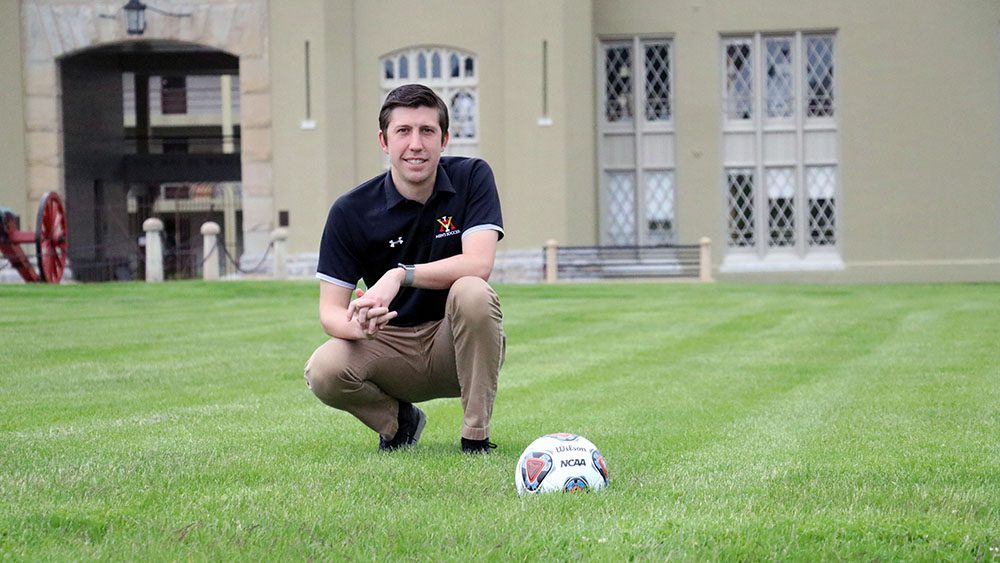New Men’s Soccer Coach: “A One-Club Guy”

Max Watson took the reins of the Keydet men’s soccer program in March 2020. Photo by Molly Rolon.

Max Watson took the reins of the Keydet men’s soccer program in March 2020. Photo by Molly Rolon.
“Success can be defined in a lot of different ways,” said Max Watson, newly promoted head men’s soccer coach. He’s referring to results, counted in wins and losses. Like every coach, he wants to win. To get there, he’s working on many pieces, ranging from playing style to defense and offense.
Peel off the layers of sports strategy, though, and Watson’s people – players and staff – are his true focus.
Watson has been on the soccer pitch since childhood. A native of New York City, he played with the same club all the way through high school.
“I’m proud of the fact that I was a one club guy,” he said.
In the soccer world, players switch clubs often – if they don’t play enough, if they don’t get their way. There’s “not a lot of loyalty,” Watson explained – and loyalty is important to him. “That breeds the college player who comes in and says, ‘Well, I didn’t play enough in my freshman year. I’m going to transfer.’ It just breeds this immediate dissatisfaction, lack of growth, lack of maturing, lack of relationships if you constantly move.”
Watson came to VMI in summer 2019 and spent one season as an assistant coach. Since his arrival, he’s found great support from fellow coaches within the athletic department. Every sport has unique requirements, but the whole department is “a team of teams,” Watson said.
His promotion to head coach coincided almost exactly with the country’s response to COVID-19. Instead of afternoon practices and a spring season, he made a quick transition to video meetings with his players.

Watson, a native New Yorker, played collegiate soccer at Franklin & Marshall College in Lancaster, Pennsylvania. He’s coached at the college level, high school level and club level. He holds a bachelor’s degree from F&M and a master’s degree from the University of Mary Washington. Photo courtesy F&M athletics.
Relationships, built on loyalty, are the bedrock to how Watson coaches – and lives. “A lot of what I do, a lot of my desires and coaching are driven off two or three things [and] they come down to relationships.”
Meeting with players digitally – especially for a new coach – is not ideal. Watson combats these hurdles with contagious, positive energy. He’s treating this situation as an opportunity.
Digitally or not, Watson is teaching the young men on his team how to act. “It’s the way we carry ourselves and the way in which we choose to do things – the key word being ‘choose.’”
Those actions dictate the entire program. Watson’s ideals for his team simply carry VMI’s honor code “another step further. For me, it’s how I want them to handle training.”
Meeting with players digitally – especially for a new coach – is not ideal. Watson combats these hurdles with contagious, positive energy. He’s treating this situation as an opportunity.
“Training habits in practice are all going to translate to results. And not just … positive results, but also the way you feel about those results,” Watson explained. “Over the course of a long grueling season, your mood, your emotions – the way you treat everything we do in the program is important.”
Internally, the team has been growing and improving in the past few years, Watson said, though the behind-the-scenes efforts haven’t necessarily been seen in the blunt tally of wins and losses. The team could be “poised to have a little bit of a breakout season,” he said in an April interview. “But you know that’s not going to happen unless we take advantage of those hours right now.”
To that end, he and his staff have continued to build relationships with their team through available means. Some of the background work done in past years shows through the team’s leadership: The team’s captains, Richard Quispe ’21 and Broden Schull ’22.
One of Watson’s continuing goals is to build loyalty and retain players. Having responsible, high-performing upperclassmen as team captains is good start.
“They’re doing a great job, and they’re providing some quality leadership to the group,” Watson said of his captains. “They’re able to provide additional guidance to the guys and talk amongst themselves … they’ve been a huge help. And obviously I’m growing closer and closer with them. And as I said, it’s all about relationships. It’s all about that trust.”
Watson is happy to build on the groundwork laid by his predecessor, Charlie Hubbard – who is also a good friend and mentor to Watson – and who was instrumental in Watson’s decision to accept a position at VMI.
By being organized and “clever” with the time he does have with his team, he continues to introduce new ideas and concepts. When the team does come back together, players will have several months of familiarity with different ideas – and will be able to execute them on the field.
Watson is also looking for other ways to build his team’s camaraderie. He wants his team to have the “desire and the ability” to serve the local population. He’s been examining service opportunities, for when the team is together again in Lexington.
“A program that serves together is going to win together,” he said. “The increased time that we’re able to spend together, especially in a capacity where we are working for others [is] going to make us a tighter knit group.”
After high school, Watson played college soccer at Franklin & Marshall College in Lancaster, Pennsylvania, where he earned a Bachelor of Arts degree in business. He earned a Master of Business Administration degree from the University of Mary Washington. He’s coached at the college level, at the high school level and for clubs.
Coaching, Watson said, is a “windy journey.”
Here’s to hoping that the new men’s soccer coach – young, enthusiastic and determined – has a long, straight stretch ahead.
